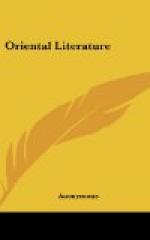It is indeed necessary to recollect that in reading the episodes of Antar we have been taken back to the heroic age in the Arabian peninsula. War is considered the noblest occupation of a man, and Khaled despises the love of a noble maiden “from pride in his passion for war.” Antar has his famous horse as the Cid had his Babicca, and his irresistible sword as Arthur his Excalibur. The wealth of chiefs and kings consists in horses and camels; there is no mention of money or jewelry. When a wager is made the stakes are a hundred camels. The commercial spirit of the Arabian Nights is wanting in this spirited romance of chivalry. The Arabs had sunk to a race of mere traders when Aladdin became possessed of his lamp, and the trickery, greed, and avarice of peddlers and merchants are exhibited in incident after incident of the “Thousand and One Nights.” War is despised or feared, courage less to be relied upon than astute knavery, and one of the facts that strikes us is the general frivolity, dishonesty, and cruelty which prevail through the tales of Bagdad. The opposite is the case with Antar. Natural passion has full play, but nobility of character is taken seriously, and generosity and sensibility of heart are portrayed with truthfulness and naivete. Of course the whole romance is a collection of many romantic stories: it has no epic unity. It will remind the reader of the “Morte d’Arthur” of Sir Thomas Malory, rather than of the “Iliad.” We have chosen the most striking of these episodes as best calculated to serve as genuine specimens of Arabian literature. They will transport the modern reader into a new world—which is yet the old, long vanished world of pastoral simplicity and warlike enthusiasm, in primitive Arabia. But the novelty lies in the plot of the tales. Djaida and Khaled, Antar and Ibla, and the race between Shidoub and the great racers Dahir and Ghabra, bring before our eyes with singular freshness the character of a civilization, a domestic life, a political system, which were not wanting in refinement, purity, and justice. The conception of such a dramatic personage as Antar would be original in the highest degree, if it were not based upon historic fact. Antar is a more real personage than Arthur, and quite as real and historic as the Cid. Yet his adventures remind us very much of those which run through the story of the Round Table.




